Immigration at the Border
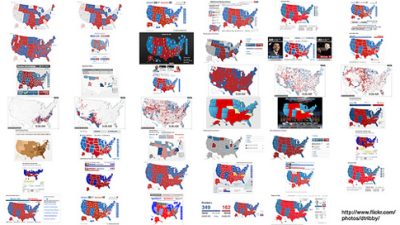
Data Shows Americans Support CIR, Discredits Restrictionist’s Claims
Immigration restrictionists don’t know what to do with themselves. First off, none of the vehemently anti-immigrant candidates for president got their party’s nomination (or a great deal of public support), and both presidential candidates agreed on the need for comprehensive immigration reform – including a path to citizenship for undocumented immigrants. Restrictionist poster child Lou Barletta failed to win his election for Congress in Pennsylvania and Libby Dole in North Carolina along with other enforcement-only candidates across the country lost to candidates who supported enforcement PLUS some kind of immigration reform. In the National Review Online, Mark Krikorian--Director of restrictionist organzation Center for Immigration Studies, apparently unable to find any other light at the end of the tunnel, hopes that President Obama will continue the heavy handed enforcement measures initiated by the Bush Administration, including a vast expansion of the flawed E-Verify employment verification system. Without doing so, Krikorian claims, Obama will lose his credibility in the eyes of Americans. Read More

DHS No-Match Rule is Another Nail in Economy’s Coffin
At a time when the financial markets are in crisis, unemployment rates are rising, Americans are losing their homes, and the future of small businesses is uncertain, the federal government persists in pushing for implementation of the DHS no-match rule—another nail in the U.S. economy's coffin. While this new rule cannot be immediately implemented because it has been blocked by a court injunction, the government continues its efforts to dissolve the court order and move forward. However, in their rush to implement before their term expires, they are ignoring the fact that U.S. citizens and other lawful workers could lose their jobs due to database errors and employer mistakes and misuse. Last year the New York Times called this program "A Foolish Immigration Purge" and an economic analysis by the U.S. Chamber of Commerce estimates that the new rule could result in 165,000 lawful U.S. workers possibly losing their jobs, at a cost to employers of about $1 billion per year. Read More

NC Sheriff Steve Bizzell Trashes Immigrants
It's no surprise that half of all Latinos, immigrant and non-immigrant, are saying that their situation in this country is deteriorating when highly-regarded and powerful officials like Sheriff Steve Bizzell of Johnston County in North Carolina say such denegrating things as "Mexicans are trashy" and that "All they do is work and make love." Jennifer Rudinger of the ACLU told the Associated Press: "[Bizzell's comments] go from simply stating opinion to constituting illegal racial profiling if these opinions are reflected in practice...It's one thing to think something and say something. It's another to have that kind of bias carried out and enforced." North Carolina has put into action a federal program known as the ill-fated 287(g) program which gives specially trained police officers to enforce federal immigration law. The program has had a startling price tag--both financial and social--in communities like Maricopa County, Arizona where the The Sheriff’s Office created a $1.3 million deficit in just three months as a result of its 287(g) agreement. Read More
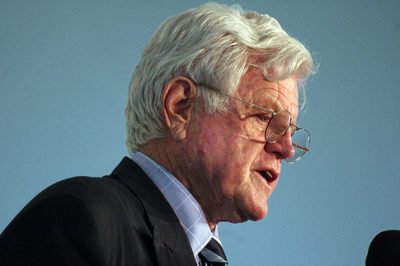
Menendez-Kennedy Raids Bill Reintroduces Rule of Law to DHS
Last week, Senators Menendez (D-NJ) and Kennedy (D-MA) introduced a bill that promises to reintroduce the rule of law and the basic principles of fairness and humanity to the enforcement of our country’s immigration laws. The Protect Citizens and Residents from Unlawful Raids and Detention Act (S.3594) seeks to establish minimum standards of treatment for U.S. citizens, lawful permanent residents and immigrants who are impacted by immigration enforcement operations. In recent months, Immigration and Customs Enforcement (ICE) has dramatically stepped up interior enforcement efforts and it’s no secret that hundreds of ICE detainees have been grossly denied not only due process protections, but also the fair treatment that every person, regardless of their immigration status, deserves. This failure to abide by the rule of law has resulted in utter chaos: U.S. citizens and lawful residents have been mistakenly detained; workers have been retaliated against for exercising their rights to organize in the workplace; and DHS officials have raided private homes without a warrant. Read More
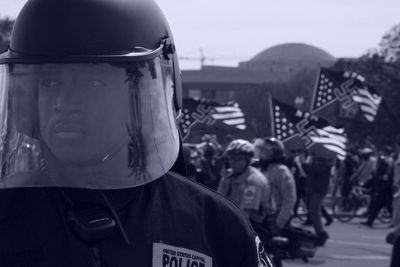
One in Ten Latinos Asked for Papers for LWL: Living While Latino
The current climate of undeterred public immigrant-bashing along with an immigration policy of "attrition through enforcement" has cultivated unfettered hatred and bigotry against an entire ethnic population. A recent survey by the Pew Hispanic Center shows its toll: half of all Latinos, immigrant and non-immigrant, say that their situation in this country is deteriorating and is worse now than it was a year ago. One in seven Latinos are reporting ethnic discrimination in finding or keeping a job and 10% said the same thing about housing. But the most stunning finding is that nearly one-in-ten Hispanic adults--native-born US citizens and immigrants alike--report that, in the past year, the police or other authorities have stopped them and asked them about their immigration status. One in ten Latinos were stopped and asked for "papers." What can that statistic represent other than a gross abuse of power by federal and local authorities? Vicious public denunciations of undocumented, brown-skinned immigrants -- once limited to hard-core white supremacists and a handful of border-state extremists -- are increasingly common among supposedly mainstream anti-immigration activists, media pundits, and politicians and are surely fueling the problems that Latinos are facing. While their dehumanizing rhetoric typically stops short of openly sanctioning bloodshed, much of it implicitly encourages or even endorses violence by characterizing immigrants from Mexico and Central America as 'invaders,' 'criminal aliens,' and 'cockroaches.' In Virginia, a Prince William County and ardently anti-immigrant community task force appointee has suggested spending tax dollars to look into whether "illegal aliens have a preferred breeding season." He has also referred to undocumented immigrants as "scourge that's plaguing neighborhoods" and an "invasion of this country." Read More

CIS Warps Accuracy of Costly and Error-Ridden E-Verify
The Center for Immigration Studies (CIS) released a new and highly misleading “report” claiming that E-Verify--a federal web-based employment verification program--is 99.5% accurate. This is yet another report in CIS’s long series of dubious “studies” issued to stall meaningful immigration reform and push its deportation-only agenda. By claiming that E-Verify is highly accurate, CIS believes it can convince the public and Congress that the program must be reauthorized and expanded so that it would be mandatory for every single employer. This would mean that every single U.S. worker would have to get permission from the government to work – and the impact of a single error could be devastating. CIS can continue to use statistics that make E-Verify attractive. However, nothing will change the fact that E-Verify is not a solution to our nation’s serious immigration problems, and that attempts to expand the program will harm lawful U.S. workers. The CIS report is based on misleading data coming from a small sample of 1,000 queries to the system coming from voluntary E-Verify users in 2007. Seeing as only about 1% of employers are currently using E-Verify, the results are not useful for predicting what would happen if all 7 million U.S. employers were forced to use the system. Read More

Arizona Court Backs Error-Riddled E-Verify
On Wednesday, September 18, 2008, a federal appeals court in Arizona upheld a state law which revokes business licenses of employers who “knowingly hire” unauthorized workers. The law was challenged by business and civil-rights groups who highlighted the difficulties companies in Arizona face as they are threatened with closure if the error-riddled and unreliable E-Verify employment verification program, which they are mandated to use, fails. The 12-year-old E-Verify pilot program has never become a permanent and mandatory federal law because of questions into its reliability. Yet in 2007, Arizona legislators set up a requirement for E-Verify, leaving businesses holding the bag. While enforcement is indeed a critical piece of immigration reform, it must go hand in hand with comprehensive solutions that fix our broken immigration system. Furthermore, the power over immigration laws must remain in the hands of the federal government and not deregulated down to the state level. The 9th circuit has upheld a law that not only threatens Arizona businesses, but an already struggling state economy. Read More
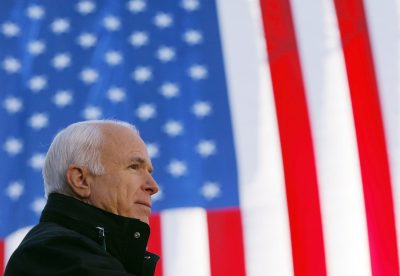
McCain Feels the Heat from Anti-Immigration Movement
John McCain was an early supporter of comprehensive immigration reform, but in this presidential campaign, McCain has changed his position to come down harder on the issue. Many political analysts say he did so to appease anti-immigration activists in key swing states-Arizona, Colorado, Florida, New Mexico, and Nevada. Read More
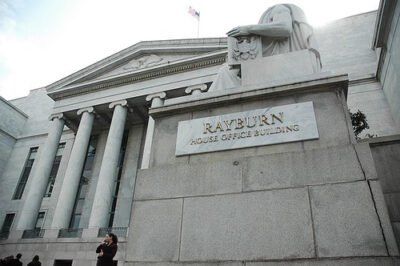
Congress Event Perpetuates Myth that Immigrants are Criminals
This morning, Republican members of the House Judiciary Subcommittee on Immigration perpetuated the persistent myth of immigrant criminality with their event on “The Toll of Illegal Alien Criminals on American Families.” The event was spearheaded by Lamar Smith (R-Texas), Steve King (R-Iowa) and Howard Coble (R-NC). Tensions ran high as witnesses ranging from bereaved family members to the President of the Houston, Texas, Police Officers’ Union, to the Chairman of the Prince William County Board of Supervisors made the case that the loss of innocent citizens is a direct result of not cracking down on “illegals” in the US. The witnesses demanded policies that would make life so miserable for immigrants, that they would be driven to self-deport. One witness even received enthusiastic applause after suggesting birth-right citizenship be repealed. Read More

Rep. Virgil Goode’s Attack on Children of Immigrants
Rep. Virgil Goode repeatedly used the derogatory term “anchor babies” during a Wednesday debate. Last week, the habitually offensive Representative Virgil Goode (R-VA) callously attacked the US-born children of immigrants. Goode repeatedly used the term "anchor baby," a notoriously derogatory term employed by anti-immigrant organizations and restrictionists to describe the children of non-citizens who were born in the US and therefore "facilitate" immigration through family reunification under the longstanding provisions of the Immigration and Nationality Act of 1965. In his attack, Goode claimed: Only those who want to coddle and cater to the illegals say that they are beneficial to the workforce...And I gave you one very specific: the anchor baby. Which means you come over in this country, have a kid, and the kid's an automatic citizen. A huge cost. Yet Goode's analysis is naive, simplistic and plainly misinformed. Aside from using dehumanizing rhetoric to suggest the government should repeal the 14th amendment which provides for natural-born citizenship, Rep. Goode overlooks the national benefits of family-based immigration: Read More
Make a contribution
Make a direct impact on the lives of immigrants.
